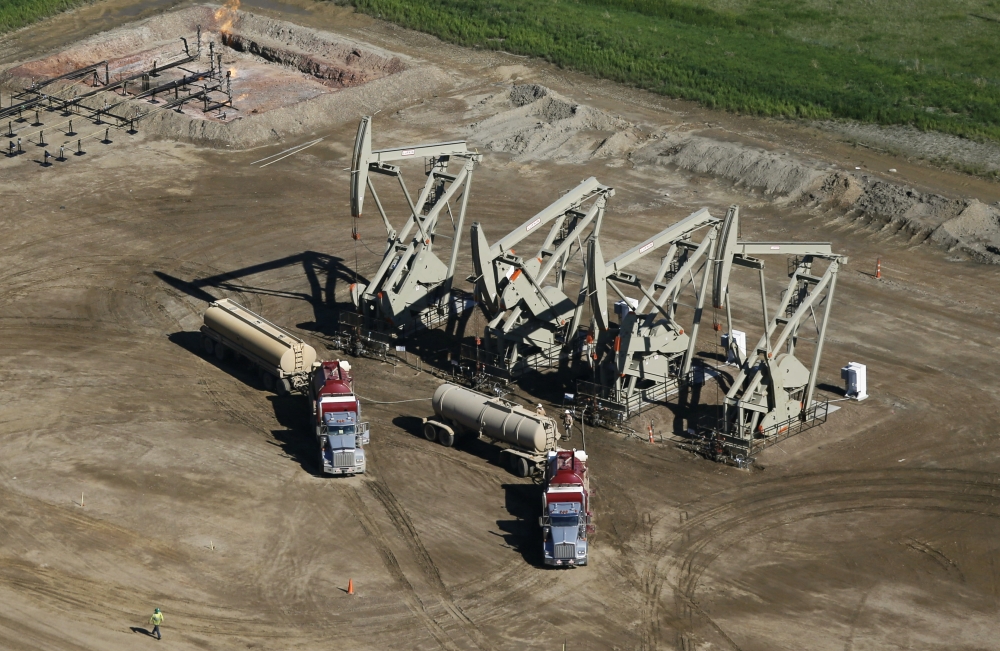WASHINGTON — The falling oil and gasoline prices that for months have coincided with strong U.S. hiring have helped most Americans. But they’ve come at a painful cost for workers in the energy and mining sector: 122,300 lost jobs in the past year.
Even as workers nationwide are earning slightly more than they did a year ago, average wages have tumbled 1.5 percent to $26.72 an hour for energy production workers.
The November jobs report that the government released Friday illustrated the divide between the broad economy and the ailing fossil fuels industry: Overall, U.S. employers added a robust 211,000 jobs and the unemployment rate held steady at a low 5 percent. But the energy industry, reeling from falling oil prices and weakening global demand, lost 11,300 jobs.
In just 18 months, oil prices have cratered from $107 a barrel to roughly $40. And gasoline prices have plunged from around $3.70 a gallon to $2.05. Those prices are poised to fall further, with OPEC deciding Friday to keep production running high.
One measure of the damage: Even as the overall U.S. stock market rocketed up 2 percent on Friday, an index of oil and gas stocks tracked by the New York Stock Exchange fell 0.5 percent.
The industry’s layoffs are expected to pile up as energy companies try to shore up their finances in light of the sharply lower prices.
“This is likely going to continue for six months or so as things settle out,” said Ken Medlock, an economist and senior director at Rice University’s Center for Energy Studies in Houston.
Medlock said the rapid hiring that energy companies embarked on five years ago as fracking unlocked oil and natural gas from shale won’t likely return soon. There will be less impetus to develop fields and increase production as long as prices stay low.
For most American consumers and companies, cheaper energy has been an unexpected gift. Drivers are paying less for gasoline. Jet fuel costs have plunged for airlines and shipping firms. Heating oil expenses dipped ahead of winter.
Average gas prices nationwide are likely to slide below $2 a gallon in the next several days, bringing them to their lowest level since March 2009, said Tom Kloza, global head of energy analysis at the Oil Price Information Service.
“There is going to be a lot more money for consumers to spend,” Kloza said. “Whether they spend it and that leads to more jobs is an open question.”
The outlook is rather different in oil country.
Since August, Texas’ unemployment rate has risen as the state has shed oil and related manufacturing jobs, according to the Bureau of Labor Statistics. More than 17 percent of the mining jobs – which include oil and natural gas – have disappeared from North Dakota in the past year.
Other fossil fuels have also collapsed in price, including natural gas and coal. The result is fewer mining jobs in states such as West Virginia and Kentucky.
Bruce Bullock, director of the Maguire Energy Institute at Southern Methodist University in Dallas, said he expects more industry bankruptcies and mergers, both of which will cost some employees their jobs.
Even if prices recover, Bullock said, the industry is unlikely to quickly increase hiring. He expects companies to increasingly automate work with robots and other machines.
“The industry will be more efficient; it won’t need as many people as it did before,” Bullock said.
The world’s appetite for all fossil fuels has been eroded by anemic economic growth. China has slowed, Europe is stumbling and Japan has lapsed into recession.
Copy the Story LinkSend questions/comments to the editors.



Success. Please wait for the page to reload. If the page does not reload within 5 seconds, please refresh the page.
Enter your email and password to access comments.
Hi, to comment on stories you must . This profile is in addition to your subscription and website login.
Already have a commenting profile? .
Invalid username/password.
Please check your email to confirm and complete your registration.
Only subscribers are eligible to post comments. Please subscribe or login first for digital access. Here’s why.
Use the form below to reset your password. When you've submitted your account email, we will send an email with a reset code.